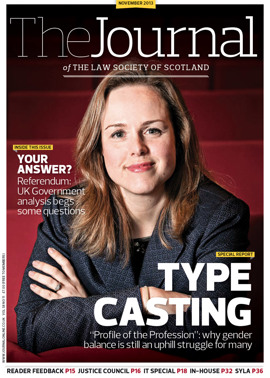Aliment in vogue again

You may have noticed, over the past year or so, a sudden vogue for periodical allowance craves which rely on the principle contained in s 9(1)(c) of the Family Law (Scotland) Act 1985.
This principle, which has been relatively little used since the advent of the Child Support Agency, requires the court to ensure that "any economic burden of caring, after divorce, for a child of the marriage under the age of 16 years should be shared fairly between the parties". The resurgence of s 9(1)(c) has been inspired partly by the Court of Session case of CB v MB [2012] CSOH 21, in which Lord Tyre awarded a capital sum to the wife, partly by reference to the fact that she would have the economic burden of caring for the parties' child. The other case last year was that of W v W 2012 Fam LR 99; 2012 SCLR 591. Sheriff Crowe at Edinburgh awarded the wife periodical allowance of £1,000 per month under s 9(1)(d), until December 2013, and thereafter £500 per month under s 9(1)(c), until the child's 16th birthday in September 2018.
Discretionary judgment
The husband in W v W appealed, and Sheriff Principal Stephen's judgment has recently been published on the Scottish courts website. The husband argued, inter alia, that the sheriff had erred in law in concluding that the wife had the main economic burden of care, and erred in concluding that it was reasonable to award periodical allowance until the child's 16th birthday. Rejecting his appeal, Sheriff Principal Stephen held that the awards made by the sheriff were essentially matters for his discretion, with which she was not prepared to interfere.
The sheriff principal makes a number of observations which may offer some guidance in approaching a s 9(1)(c) application. It did not matter that the parties in this case had a shared care arrangement, which resulted in the wife having care of the child for only some 37 days a year more than the husband. This would not necessarily mean that a s 9(1)(c) claim was inappropriate. The matter could not be reduced to an "arithmetic approach". The fact that the wife had not quantified in detail her financial needs associated with raising the child was irrelevant, since "caring for a child involves many unquantifiable responsibilities".
There is nothing in the sheriff principal's judgment, in short, which would serve as a deterrent from making a claim for periodical allowance under s 9(1)(c) in circumstances where it may be felt appropriate.
Source of funds
Another decision on financial provision published on the Scottish courts website during October is Harris v Harris (Sheriff Morrison at Edinburgh, 28 February 2013). The main point of controversy was the treatment of the wife's inherited funds of £125,000, which she had applied to the reduction of the mortgage secured over the jointly-owned matrimonial home. She had done so in a number of tranches, at a range of dates between eight months and two years prior to the parties' separation.
The wife sought to recover these sums in full, relying principally on a s 10(6)(b) special circumstances argument. She also argued as a fallback that she ought to be entitled to recover the same amount by virtue of s 9(1)(b), on the basis that she would have suffered economic disadvantage by investing her non-matrimonial funds in this manner, to the corresponding economic advantage of her husband. She sought her award as a percentage of the ultimate sale price of the house, rather than a monetary amount, on the basis that price was, at the point of proof, unknown.
Sheriff Morrison awarded the wife a capital sum, which effectively resulted in her getting back her entire contribution. A significant part of his reasoning appears to have been that these sums were paid into the parties' mortgage account not long before they separated. He declined to express the award as a percentage, on the basis that this approach would have elided the principle that the value of property be taken at the relevant date.
In his judgment, Sheriff Morrison distils from the various authorities put to him a series of useful points regarding source of funds arguments under s 10(6)(b). Among other things, he makes it clear that Cunningham v Cunningham [2001] Fam LR 12 is not authority for the proposition that the source of funds argument never applies to the matrimonial home; and that, if such an argument is accepted, there is no requirement that the sum paid in is simply repaid to its contributor in its entirety.
In this issue
- Obituary: Professor Ian Willock
- Competition damages – a rocky road ahead?
- Heart of the matter
- Law reform on track
- Turning back the clock
- Golf and the right to roam
- Reading for pleasure
- Opinion column: Ros McInnes
- Book reviews
- Profile
- President's column
- Fee review open to views
- Some more equal than others
- Balancing act
- Paving the road to reform
- Blue sky thinking?
- A singular status
- You pay your money
- Acceptable BYOD use
- Interesting times still
- Aliment in vogue again
- Scottish Solicitors' Discipline Tribunal
- Speakers rise creatively to the challenge
- Why environmental indemnity?
- SYLA presents...
- How not to win business: a guide for professionals
- File reviews - how they can help
- Ask Ash
- Making the Act work
- Law reform roundup
- From the Brussels office
- Fraud alert revived
- "Start the conversation"






